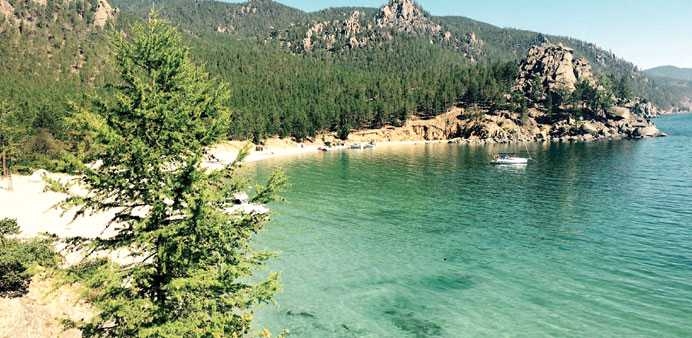By Ulf Mauder
In Siberia near Lake Baikal, clouds of smoke pass high above the water as the biting odour of forest fires is in the air.
Before this year, say environmentalists, there had never been such extensive forest fires along the picturesque mountainous shores of the lake, the world’s largest fresh-water reservoir.
Experts say this Unesco World Heritage Site is facing many threats.
“Illegal camping and camp fires, rubbish dumped everywhere, the lack of sewage treatment and a low water level are all causes for worry,” says the director of the Institute of Geography in Irkutsk, Igor Vladimirov.
The expert at the Russian Academy of Sciences regards the lake’s unique ecosystem as exposed to unparalleled stresses. It’s been only a few months since alarming reports of a water level at historic lows. Vladimirov says that was mainly due to low rainfall. Although the water level is now rising again, he says the risks have not gone away.
Experts also point to the trend of diverting water for use in hydropower energy production. This has culminated in plans by neighbouring Mongolia to build a dam on the Selenga River, considered the most important water source for the lake.
Named the Shuren Hydropower Plant and the Orkhon-Gobi Water Diversion project — the Mongolian water initiative makes all the other problems for the lake pale in comparison, says biologist and Baikal researcher Marianne Moore.
The project could upset the water balance of the internationally important wetland in the Selenga River Delta, the Wellesley College researcher says. The Delta is the most important foraging ground for the region’s fish and birds.
With this in mind, Moore has called on the World Bank to reject the Shuren project. Mongolia, she says, could be better served by using alternative energy sources such as wind or solar.
Her colleague Anson Mackay of the Environmental Change Research Centre in London notes that the Selenga River is Baikal’s most important supplier of oxygen, without which the lake will die.
In addition, the river transports important minerals and other nutrients to the lake. This process is not only vital for fish but especially for the one-of-a-kind Baikal seal, Mackay says.
The experts oppose calls by Mongolia to conduct further research into the possible effects of the dam project. For the scientists, the threats to Baikal are already clear and present, and this new project would be catastrophic, Mackay says.
The environmental organisation Baikalskaya Ekologicheskaya Volna — or Baikal Wave, for short — is fighting to prevent this environmental disaster. Over the years the organisation battled the paper and cellulose plants on the banks of the lake until they finally closed, says Baikal Wave’s Maxim Vorontsov. Now the organisation is taking aim at the Mongolian project.
Worontsov says the condition of the lake has already visibly worsened without the project.
“You can see by the green algae near the shore that the water quality is worse. What’s more, we’re experiencing a mass death of sponges in (the city of) Listvyanka where Lake Baikal flows into (Siberia’s) Angara (River),” he says, noting the importance of the sponges in purifying the water.
His organisation also complains that Baikal is being polluted by illegal building on the shore, phosphate run-off and effluent containing faeces that enters the lake.
“At lot is happening at once — including uncontrolled fishing with fine-meshed nets and increased shipping on the Baikal,” Vorontsov says.
Ultimately the environmentalists and the scientists are complaining that Russia’s leadership is taking little notice of the lake’s condition. The researchers are not alone. UNESCO also has accused Moscow of being in dereliction of its duties in handling of a valuable commodity — water — and the unique natural resource and heritage — the Baikal region. —DPA

IN NEED OF SAVING: The south-western shore of Lake Baikal in Russia.
